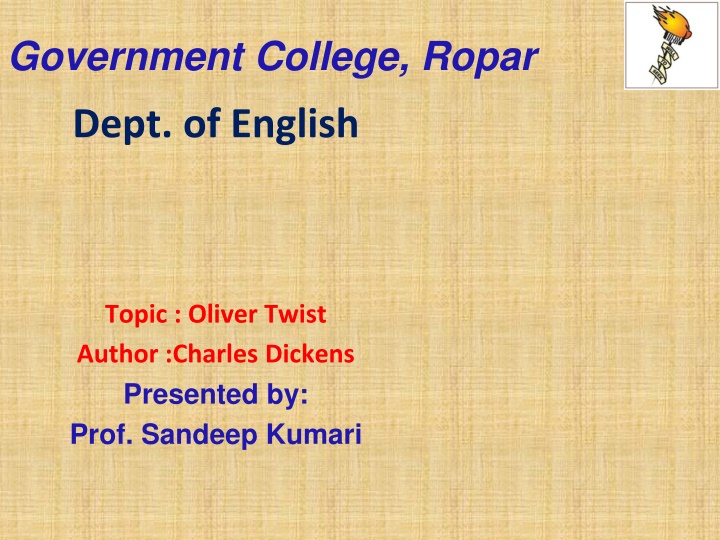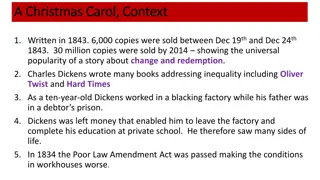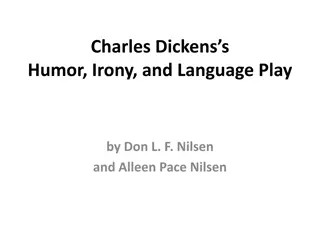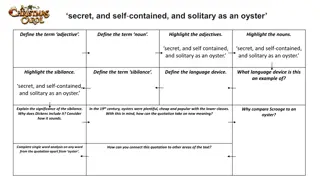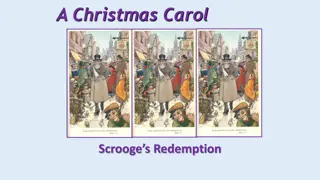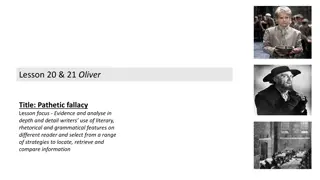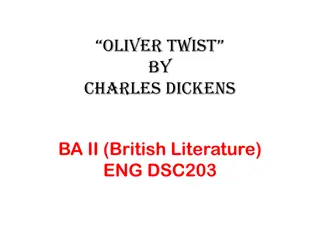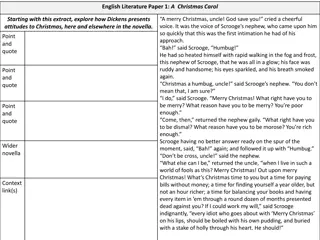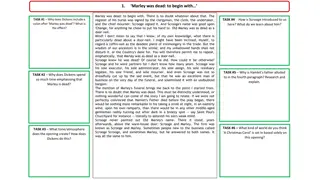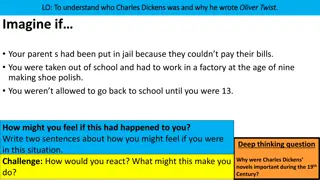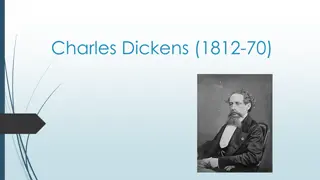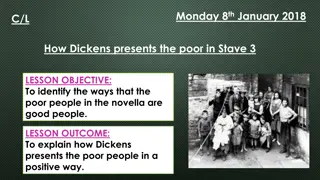Charles Dickens and His Masterpiece "Oliver Twist
Charles Dickens, a renowned English author, faced financial struggles in his early life, which heavily influenced his writing. His classic novel "Oliver Twist" explores the themes of poverty, loneliness, and perseverance through the life of an orphaned boy in Victorian England. The story delves into the harsh realities of society and the struggles faced by the protagonist amidst a cast of memorable characters.
Download Presentation

Please find below an Image/Link to download the presentation.
The content on the website is provided AS IS for your information and personal use only. It may not be sold, licensed, or shared on other websites without obtaining consent from the author.If you encounter any issues during the download, it is possible that the publisher has removed the file from their server.
You are allowed to download the files provided on this website for personal or commercial use, subject to the condition that they are used lawfully. All files are the property of their respective owners.
The content on the website is provided AS IS for your information and personal use only. It may not be sold, licensed, or shared on other websites without obtaining consent from the author.
E N D
Presentation Transcript
Government College, Ropar Dept. of English Topic : Oliver Twist Author :Charles Dickens Presented by: Prof. Sandeep Kumari
Charles Dickens 1812-1870
Family Life Father John Dickens Mother Elizabeth Barrow Father was a Navel clerk Financially comfortable and then destitute Parents were sent to a Debtors Prison
Early Writing Career 937 He wrote short humorous sketches with pictures by Boz which became known as Pickwick Papers Became famous in a short period of time and wildly popular among devoted readers awaiting his next installment Gave numerous public readings for $$$, worldwide
Success as a Novelist Nickolas Nickleby1839 Oliver Twist 1839 The Old Curiosity Shop 1841 Barnaby Rudge 1841 Martin Chuzzlewitt 1843 Dombey and Son 1849 David Copperfield 1850 Bleak House 1853 Hard Times 1854 Little Dorritt 1857 A Tale of Two Cities 1859 Great Expectations 1861
Major Themes in Dickens fiction Loneliness of childhood Oppression of poverty Uncertainty of love and marriage Indifference of social institutions Sustaining joy of family life Perseverance and sacrifice in face of untold hardships and injustice Many autobiographical links between life and writings of Dickens
Oliver Twist A Brief Introduction Oliver Twist is a child of unknown parentage born in a workhouse and brought up under cruel conditions to which pauper children were formerly exposed, the tyrant at whose hands he especially suffers being Bumble, the parish beadle. After experience of an unhappy apprenticeship, he runs away, reaches London, and falls into the hands of a gang of thieves.
The head is the old Jew Fagin, and other chief members are the burglar Bill Sikes, his mistress Nancy, and the Artful Dodger , an impudent young pickpocket. Every effort is made to convert Oliver into a thief. He is temporarily rescued by the benevolent Mr. Brownlow, but kidnapped by the gang, whose interest in his retention has been increased by the offers of a sinister person named Monks, who has a special interest in Oliver's perversion.
Oliver is now made to accompany Bill Sikes on a burgling expedition, in the course of which he receives a gun-shot wound, and comes into the hands of Mrs. Maylie and Rose, by whom he is kindly treated and brought up.
Nancy, who develops some redeeming traits, reveals to Rose that Monks knows Oliver's parentage, and wishes all proof of it destroyed, and that there is some relationship between Oliver and Rose herself. Inquiry is set on foot. In the course of it Nancy's action is discovered by the gang, and she is brutally murdered by Bill.
A hue and cry is raised; Sikes, trying to escape, accidentally hangs himself, and the rest of the gang are secured. Fagin is executed. Monks, found and threatened with exposure, confesses what remains unknown. He is the half-brother of Oliver.
He has pursued his ruin, animated by hatred and the desire to retain the whole of his father's property. Rose is the sister of Oliver's unfortunate mother. Oliver is adopted by Mr. Brownlow Monks emigrates and dies in prison. Bumble ends his career in the workhouse over which he formerly ruled
And the characters are described to be unconvincing, too: Fagin and Bill Sikes are too inhuman to be true, while the rich Mr. Brownlow and Miss Maylie are vaguely pictured as benevolent and good; Oliver himself is a pale figure who seems to be ever the helpless victim of fate. The plot has been criticized to be improbable: throughout the novel, there are too many happy coincidences to be believable.
As a realist, Dickens makes his readers aware of the inhumanity of city life under capitalism in Oliver Twist. In the first eleven chapters, he bitterly and thoroughly exposes the terrible conditions in the English workhouse of the time and the cruel treatment of a poor orphan by all sorts of philanthropists.
In the description of the thieves' den and of the under-world of London, the author succeeds in calling forth the reader's sympathy for the down-trodden people of the lower classes. They are degraded and corrupted by the social environment of the time, either climb up to be parasites or oppressors or fall to be victims of society or even criminals.
The happy ending of the Oliver Twist's life shows Dickens's optimistic belief in the inevitable triumph of good over evil. It also shows that Dickens' belief that the social problem would be settled if only every employer followed the example set by good gentlemen like Brownlow.
The famous scene in Chapter II, which is selected here, is only one of the details to show the extreme brutality and corruption of the oppressors and their agents. In this part, Oliver was beaten and punished merely because he ventured to ask for an extra portion of gruel to alleviate his intolerable hunger. It is in scenes like this that we see the great critical realist voicing the helpless sufferings of the poor and oppressed.
